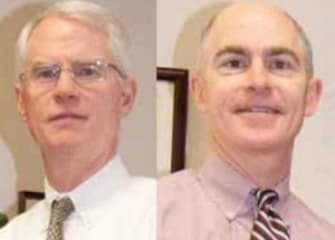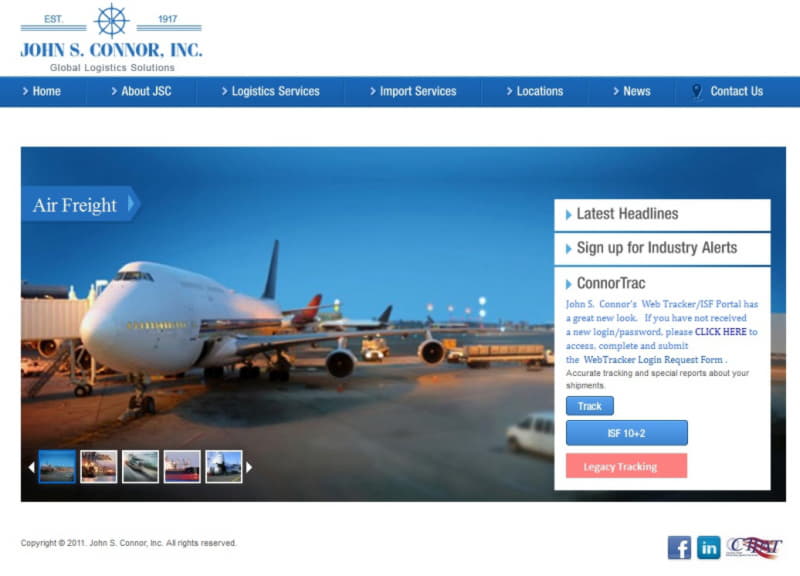
Lee Connor and Butch Connor
Click here for Part I & Part II
100 years and four generations of full-service freight and logistics management
Lee Connor and Butch Connor are the President and Vice President, respectively, of John S. Connor, Inc. Headquartered in Baltimore, JSC manages transportation and logistics throughout the world, coordinating supply chain services such as sea and air freight, project cargo, trucking, warehousing, vessel agency, and cargo security domestically and internationally—for private companies as well as government, military, and not-for-profit clients. Founded in 1917 by Lee and Butch’s grandfather, after whom the company is named, JSC has remained a very successful family business for 100 years.
Lee and Butch Connor spoke with citybizlist publisher Edwin Warfield for this interview.
EDWIN WARFIELD: How big is JSC, in terms of operations? Do you compete with multinationals?
LEE CONNOR: Our company is not a small mom-and-pop operation, but we’re not one of the big multinationals either. Our headquarters has always been in Baltimore. It’s where our largest operations center is, in Baltimore, but we also have an air freight operation at BWI. We have an air freight operation at Dulles Airport in Washington. We also have an office in Norfolk, Virginia. We have an office in Louisville, Kentucky, which developed from some special requirements in certain niche business that we handle for the beverage industry. We have an office up in Port Elizabeth, New Jersey. We also have an office in Philadelphia, which is more for our Vessel Agency Division.
We compete with these multinationals by our large network of agents all around the world. We feel we can do anything they can do, in any place in the country we have trade relations with. Those are close relationships, and they’re always under review. We have the flexibility: if we’re not happy with an agent service in Thailand or Turkey, we can change that agent, because there are other agents that we do review them from time-to-time and decide that they might be a better fit or give a better service for a certain type of business we have in that trade lane. That’s why we say we can do things that multinationals can’t in some respects because they’re stuck with their office within those places, and that’s their corporate policy, of course, to use that office.
In the marketplace, we’re kind of an in-betweener, but closer to a smaller business, but we are able to compete and we offer service on a global basis. That’s what our agent network is for, that’s what our investment in our IT infrastructure is for—to allow us to do those things.
And our people are very well trained. We spend a fair amount of time doing that and we have a fair amount of longevity in our staff. Again, the personal service aspect comes in when our staff person can get to know our customers, get to know what their idiosyncrasies of their business are, and what their special requirements are. They understand and learn more about the business.
It’s one of the nice things about our industry: we touch a lot of different industries. As I said before, people say, “What kind of products do you import or export?” Well, with our customers, we import and export almost anything you can think of. We talk about our air freight shipments of a small box on wet ice of human eye tissue that we need to get to a hospital in Saudi Arabia as soon as possible for an eye transplant, up to and including a ship load of 70,000 tons of coal that might be being exported to a steel mill or to an utility—and everything in between.
We are very much generalist. We handle a lot of different kinds of products, but we also have some niches we developed over the years. Alcohol beverages is one of those. We had some special requirements, some special regulations in the customs regs that we are pretty good experts at and can take advantage of for our customers.
Other niches we’ve gotten involved in are the defense and aerospace industry, where, as I mentioned before, some special export licenses and import licenses are required to move those kind of materials around. You have to know the regulations on where you can and cannot send those kind of products to help our customers be compliant.
We also do some work in the fine arts and antiques area, still—a very specialized area. The agricultural area—we do some exporting of some agricultural products that require some special handling. We also do some imports of some food products: frozen seafood that comes from around the world.
One of our niches is in the relief agency: disaster relief and disaster recovery. For example, we do some work for some government agencies that have to provide relief goods in places like Africa that are sometimes hard to get product to. We’ve also had some customers like a government contractor who has some really specially designed and equipped deep sea gear that does work for the Navy but also other private commercial situations.
And if you remember when the Malaysian aircraft went down and was missing somewhere over there in the Pacific Ocean—they weren’t sure where, Pacific or Indian Ocean—one of our customers who had some special gear for deep sea salvage and location called us on a Friday afternoon at 4:00: “We need to move a bunch of this gear to Australia, where we’re going to be helping with this rescue effort and salvage and try to locate this airplane.” We went to work at 4:00 on a Friday afternoon, and by Sunday evening we had a 747 on the ground at JFK and four trucks from different locations with all this heavy gear. The plane took off and was in Perth, Australia, for that gear to be loaded on vessels that were going on the search and rescue mission. That kind of specialized service is one of our hallmarks.
Connect with Lee and Butch on LinkedIn


Edwin Warfield, CEO of citybizlist, conducts the CEO Interviews.
If you're interested in reaching CEOs, please contact edwin.warfield@citybuzz.co
Connect on LinkedIn



































